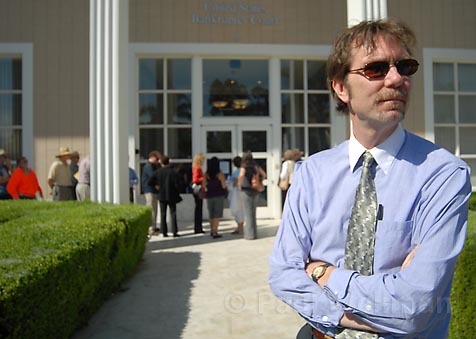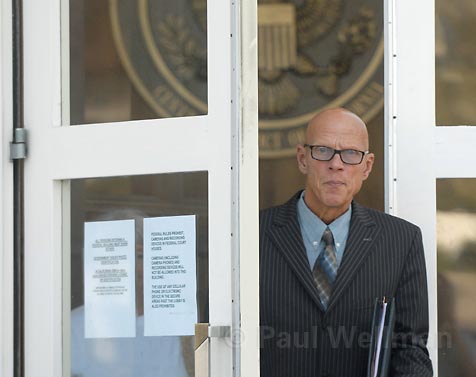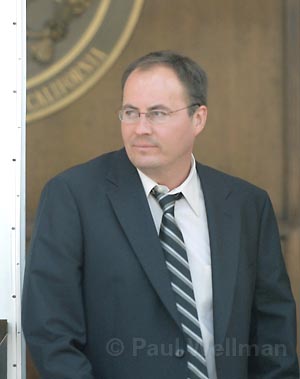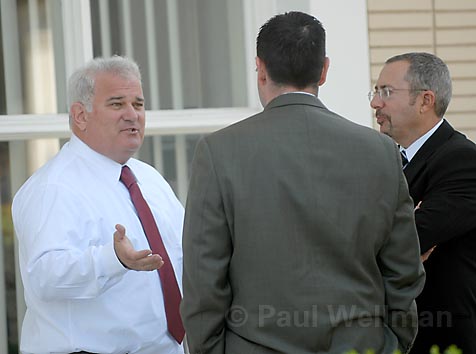A Tale of Two News-Press Histories
News-Press NLRB Hearing Kicks Off

Dozens of people clamored outside of the U.S. Bankruptcy Court on State Street before 10 a.m. Tuesday morning, August 14, awaiting the start of the National Labor Relations Board’s prosecution of the Santa Barbara News-Press for numerous alleged labor law violations. There were media types like blogger extraordinaire Craig Smith and members of the curious public, but mostly, the line forming was of subpoenaed witnesses, almost all of them former employees of the News-Press newsroom, such as former editor Michael Todd (pictured above).
Despite the fact that many of these folks are fighting for their jobs back – and plenty of back pay – the mood was jovial enough, much like a family reunion. Hugs and smiles abounded, for many former News-Pressers believe that the day of reckoning is finally here for News-Press owner Wendy McCaw. (Of course, she’s expected to draw this out on appeals if not victorious, but that wasn’t dampening the mood.)
All of the witnesses were ushered in first, which took nearly 45 minutes, meaning that the general public and some reporters were still waiting as the hearing’s opening statements were unveiled. (According to earlybird Nick Welsh, who was already inside, the opening statements of the government prosecutors were mere reiterations of the charges.) By the time the leftover media did get inside around 10:30 a.m., Teamsters attorney Ira Gottlieb was finishing his opening, telling the same story that we’ve been hearing for months now: that reporters were reprimanded, fired, and otherwise mistreated for their union involvement.
And then it was time for the other side of the story, a different, reinterpreted, and less publicized version of events. This was the realm of slick superstar attorney Barry Cappello, who opened by criticizing the government’s decision to lump the 15 charges together rather than breaking them up into separate cases. As an excuse for why he was about to give a longer opening than his opponents combined, Cappello explained that this hearing’s “potpourri of items” amounted to “15 separate trials.” Judge William Kocol assured, “If it gets long, be sure I’ll let you know.” And he did, multiple times.

Cappello prefaced his explanation of events by warning the judge that he was about to hear a case that dealt with nontraditional labor issues. Unlike most NLRB hearing, this case was not about wages and benefits, said Cappello. Rather, he explained, “These are employees who have testified and will testify here that their sole goal is to take over the newspaper so that the owner of the newspaper has no involvement in how they write their stories or when they write their stories.” It was a statement that everyone in the room could agree with.
Cappello then painted an entirely different picture of what happened in the years preceding July 2006, when the paper’s senior staff summarily resigned. He explained that when she bought the paper, Wendy McCaw “wanted a local newspaper focused on local issues.” Furthermore, since studies showed that readers found the newspaper to be biased, she wanted to rid the paper of its supposed slant. And that is why, according to Cappello, that reporters Anna Davison and Melinda Burns were fired.
Cappello, who confirmed that McCaw herself would take the stand to explain her side of the story, then began discussing the nature of what he called the News-Press “firestorm,” which ignited over two issues. The first was what Cappello implied was over-coverage of editorial page editor Travis Armstrong‘s arrest for drunk driving and subsequent sentencing. McCaw ordered that article not be put in the paper, and the uproar in the newsroom began. And that uproar was inappropriate, according to Cappello, because the owner of a business can do whatever he or she wants, even if it means killing news stories at will.

And then came the Rob Lowe incident, in which McCaw also intervened to reprimand editors and a reporter for printing the celebrity’s address in a planning story about a house that had yet to be built. The paper had an unofficial policy of not printing the addresses of celebrities, said Cappello, to avoid stalking and potential kidnapping. With much surprise in his voice, Cappello told the judge that these disgruntled employees “believe this publisher has no right to stop people from using their paper as a stalking guide for celebrities in this town.”
The judge then leaned on Cappello to pick up the pace in his opening statement, so he ran through the following defenses at a much faster clip. As for the cancellation of Starshine Roshell’s column, which the union and government claims was done in retaliation for her union activities, Cappello explained that her column was just one of eight cancelled as part of a company-wide decision. That decision, Cappello implied, was just one way to root out bias in the paper.
As to the reporters fire for hanging the banner on the overpass, Cappello said he would show that the News-Press management did not know it was a union activity. Rather, those six reporters were fired for disloyalty. As to the surveillance of union events in De la Guerra Plaza, Cappello said that the cameras were used merely to assure there as no property damage done to the News-Press building. As to the library incident, when attorney David Millstein and accountant Norman Colavincenzo (who Cappello called the paper’s CFO), it was on public property, and therefore open to all.
Steepleton Takes the Stand
After the lunch break, it was much easier to get in the courtroom because the subpoenaed witnesses were sent home. The courtroom is the same as the NLRB hearings on the union vote in January. (For those roundups, see day one here, day one, part two here, and the last day here.) But this time the union is sitting on the left side of the room, at the same table as NLRB attorneys Steve Wyllie and Brian Gee. The News-Press representatives are on the right side, with Cappello, his assistants Matt Clarke and Dugan Kelley, and a reported union-busting expert named Michael Zinser from Nashville. Next to them are files piled head-high and five-feet-wide, apparently the documents they’ll rely on to set their client free.

The first witness to be called by the NLRB was Scott Steepleton, the News-Press‘ associate editor since August 2006, right after the “firestorm” left the paper without any upper management and he was promoted to run the paper. He was looking a little trimmer that his last NLRB performance, wearing a white shirt and deep red tie. When asked by attorney Wyllie what his job was, Steepleton replied, “The buck stops with me in the newsroom.” Steepleton had no trouble admitting that he’d been the hatchet man for the News-Press, firing and reprimanding an impressive slew of former employees.
The notion of bias was explored for awhile, with Steepleton defining it as “telling only one side of a story.” He also said that employees had been told that “the goal of the News-Press is to be an unbiased newspaper.” However, Steepleton did not conduct any training or tell the staff in writing that this was a new directive. Wyllie seemed to be laying the groundwork to show that both Melinda Burns and Anna Davison, allegedly fired for their bias and not their union support, were not given fair warning, nor was the notion of unbiased reporting effectively explained by management.
As a counterpoint, Wyllie produced the article about the first NLRB hearing that was bylined as a “staff report.” Originally assigned to Leana Orsua, she called in later that day to say she couldn’t write the story. When asked if he wrote the story, Steepleton said, “I don’t recall.” It would become a very common response all afternoon. Later, Wyllie asked if the story, which omitted large amounts of information but reported the news that was favorable to the newspaper, was biased, Steepleton said he thought the piece in question was fine.
The day’s most exciting exchange came when Wyllie tried to show that Steepleton fired Dawn Hobbs, Rob Kuznia, Barney McManigal, John Zant, Tom Schultz, and Melissa Evans because of their involvement in the Teamsters-sponsored banner hanging over a 101 overpass. The banner said “Cancel Your Newspaper Subscription Today,” but the News-Press is contending that since the sign did not say Teamsters, then management did not know it was a union event.
Steepleton employed the “do not recall” response numerous times in this line of questioning. Wyllie did not let up, pushing for a clear answer of whether or not Steepleton knew that this was a union event when he fired the reporters for “disloyalty.” With his voice slightly cracking and long pauses between his answers, Steepleton was clearly uncomfortable, trying desperately not to implicate himself. Had he done so, that part of the case – which would result in the most rehiring and largest amount of back-pay – would seemingly be decided. At long last, he blurted, “Sir, there were union people involved, but I don’t know if I thought this was part of a union campaign.” When Wyllie asked the judge to get Steepleton to answer more clearly, the judge said that the record would be clear as to Steepleton’s response.
The rest of Wyllie’s questioning concerned Melinda Burns’ and Anna Davison’s alleged bias, with Steepleton admitting that he too had been reprimanded by McCaw for allowing some “biased” reporting to wind up in the paper. The firing of editor Bob Guiliano was also discussed, with Steepleton saying he was fired for lacking management skills. Wyllie also brought up evidence that others had written biased stories, but not been fired, and also put the performance review of Charlotte Boechler-Steepleton’s wife, who was promoted to assistant features editor earlier this year-as entered into the record. Wyllie then ended his questioning of Steepleton, allowing Teamsters attorney Gottlieb about an hour of questioning, which will continue tomorrow.
Overall, the day was quite a bore, with lots of long pauses as attorneys shuffled through pages of evidence to find the correct exhibit. It was curious that the NLRB attorneys weren’t better prepared with their documents, and even the judge remarked at the end of the day that he’d hope they could find a better method of having the witnesses review evidence. Nonetheless, the feds have kicked off their case against the News-Press and it’s sure to get more exciting, especially with the reclusive Wendy McCaw expected to take the stand.



